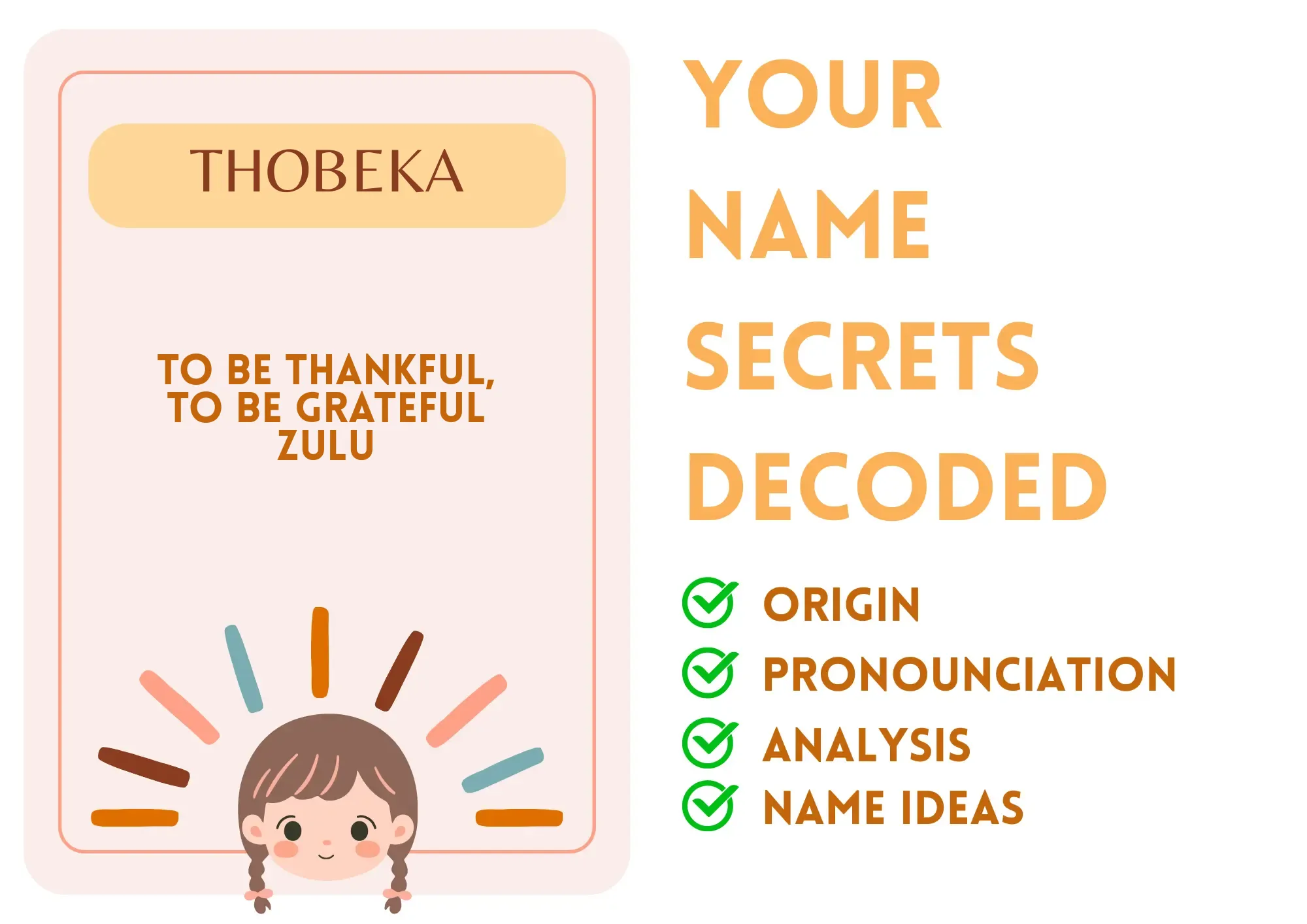
Thobeka
Thobeka carries the meaning of 'to be thankful' or 'to be grateful' in the Zulu language, reflecting a deep appreciation for the blessings of life. The name is predominantly used in Southern Africa, particularly within the Zulu culture. While it is typically a feminine name, it is appreciated in some instances as a unisex name as well.
The name Thobeka resonates strongly with the values of gratitude and appreciation, making it a popular choice among parents seeking to imbue their child's name with significant positive connotations. It is easy to pronounce and has a melodic quality that many find appealing.
Thobeka does not have notable historical significance beyond its cultural roots, yet it embodies the spirit of appreciation deeply valued in African communities. In popular culture, it may not be widely represented in international media, but it might appear in local stories or literature reflecting Zulu heritage.
Basic Information
Gender: Girl
Sounds Like: toh-BEH-kah
Pronunciation Explanation: The emphasis is on the second syllable, pronounced as 'BEH', while the first syllable is soft, and the last syllable is pronounced as 'kah'.
Summary and Meaning
Meaning: to be thankful, to be grateful (Zulu)
Origin: Thobeka has South African origins, particularly within the Zulu culture and language.
Usage: Thobeka is primarily a feminine name, though it may be used in a unisex context depending on family traditions.
Name Number (Chaldean)
Name Number (Pythagorean)
Popularity (Global Rank)
Overall: 14520
Girls: 43381
Most Popular in
Religious and Cultural Significance
Religion: African Spirituality
Background: Thobeka is tied to Zulu culture, where expressions of gratitude and blessings are central to community values and spirituality.
Cultural Significance: The name Thobeka reflects the importance of thankfulness and appreciation within the Zulu community, often chosen for blessings received at a child's birth.
Historical Significance: Although not heavily documented in historical texts, Thobeka represents important cultural values inherent in Zulu traditions, particularly regarding gratitude.
Popular Culture
Literature and Mythology: Thobeka may appear in local Zulu narratives and stories, highlighting themes of family, gratitude, and community.
Movies and Television: While there are no notable representations in mainstream cinema, Thobeka can occasionally be referenced in South African films or shows that explore Zulu culture.
Feelings and Perceptions
Perception: Thobeka is generally viewed positively, associated with kindness, gratitude, and deep cultural roots. Many appreciate its melodic sound and meaningful context.
Positive Feelings: Grateful, kind, culturally rich, melodic, warm.
Negative Feelings: May be unfamiliar to those outside Southern Africa, leading to potential mispronunciation.
Practical Considerations
Ease of Writing and Calling: Thobeka is relatively easy to write and pronounce, consisting of seven letters and three syllables, making it memorable yet distinctive.
Common Typos and Misspellings: Thobekaah,Thobeka,Thobekah,Thobika
Common Nicknames: Tbo,Thobie,Keka
Thobeka Popularity
Thobeka Usage and Popularity By Country
| Country | Rank (Overall) |
|---|---|
| South Africa | 585 |
| Lesotho | 3000 |
| Iceland | 3049 |
| Zimbabwe | 6151 |
| Norway | 7037 |
| Ireland | 8170 |
| United Kingdom | 12269 |
| Poland | 16125 |
| Australia | 22725 |
| Saudi Arabia | 25282 |
Thobeka Usage and Popularity By City
| City | Rank (Overall) |
|---|---|
| Johannesburg | 861 |
| Durban | 128 |
| Cape Town | 1133 |
| Richards Bay | 75 |
| Port Elizabeth | 802 |
| Bisho | 425 |
| Bloemfontein | 844 |
| Newcastle | 984 |
| Pietermaritzburg | 164 |
| Dundee | 539 |
Compatibility Analysis
Famous Persons Named Thobeka
No results found for Thobeka.
Related Names
Similar Sounding Names:
Tobias,Tobey,Tobeka

